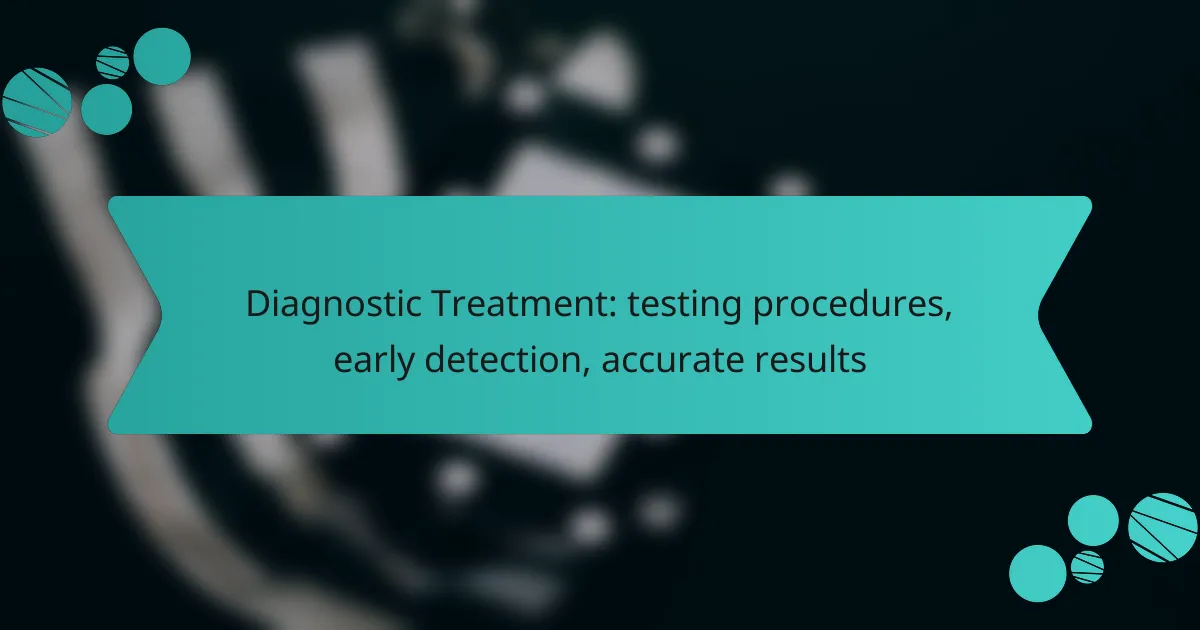Diagnostic treatment plays a vital role in early detection and ensuring accurate results for various health conditions. Through a range of procedures such as blood tests, imaging, and genetic testing, healthcare providers can identify issues at their earliest stages, facilitating timely interventions and improving patient outcomes.

What diagnostic treatments are available in Canada?
In Canada, various diagnostic treatments are available to aid in early detection and accurate results for numerous health conditions. These include blood tests, imaging procedures, biopsies, genetic testing, and urinalysis, each serving distinct purposes in the diagnostic process.
Blood tests
Blood tests are essential for diagnosing a wide range of medical conditions, including infections, anemia, and chronic diseases. Common tests include complete blood counts (CBC), metabolic panels, and lipid profiles, which provide valuable insights into overall health.
When preparing for a blood test, it is crucial to follow any fasting instructions provided by your healthcare provider. Results typically take a few hours to a few days, depending on the test type.
Imaging procedures
Imaging procedures, such as X-rays, MRIs, and CT scans, are vital for visualizing internal structures and identifying abnormalities. These non-invasive techniques help doctors diagnose conditions like fractures, tumors, and organ diseases.
Patients should discuss any concerns about radiation exposure with their healthcare provider, especially for repeated imaging. Preparation may vary; for instance, some scans require fasting or the use of contrast agents.
Biopsies
Biopsies involve the removal of tissue samples for laboratory analysis, providing definitive diagnoses for conditions like cancer. There are several types of biopsies, including needle, excisional, and endoscopic, each suited for different situations.
Before a biopsy, patients should understand the procedure’s risks and benefits, as well as any necessary pre-procedure preparations. Results can take several days to weeks, depending on the complexity of the analysis.
Genetic testing
Genetic testing analyzes DNA to identify genetic disorders or predispositions to certain diseases. This testing can guide treatment options and inform family planning decisions.
In Canada, genetic testing is often covered by provincial health plans when medically indicated. Patients should consult with a genetic counselor to understand the implications of test results and potential next steps.
Urinalysis
Urinalysis is a simple test that examines urine for signs of various health issues, including urinary tract infections, kidney disease, and diabetes. The test can include physical, chemical, and microscopic evaluations.
Patients typically provide a midstream urine sample, and results are usually available within a day. It is important to follow any specific instructions regarding hydration and medication before the test to ensure accurate results.

How do diagnostic tests aid in early detection?
Diagnostic tests are essential for identifying health issues at their earliest stages, allowing for timely intervention and treatment. By providing accurate results, these tests help healthcare providers make informed decisions, ultimately improving patient outcomes.
Identifying diseases at initial stages
Early detection of diseases significantly increases the chances of successful treatment. Diagnostic tests, such as blood tests, imaging scans, and biopsies, can reveal conditions like cancer, diabetes, or heart disease before symptoms appear. Regular screenings, based on age and risk factors, are crucial for catching diseases early.
For instance, mammograms are recommended for women starting in their 40s to detect breast cancer early, while colonoscopies are advised for adults over 45 to identify colorectal cancer. Following recommended screening schedules can lead to early diagnosis and better prognoses.
Monitoring high-risk patients
For individuals with a higher likelihood of developing certain conditions, regular diagnostic testing is vital for monitoring their health. This proactive approach allows healthcare providers to track changes in a patient’s condition and adjust treatment plans accordingly. High-risk patients may include those with a family history of diseases, chronic conditions, or specific lifestyle factors.
For example, patients with diabetes should undergo regular blood glucose testing to manage their condition effectively. Similarly, individuals with a family history of heart disease may benefit from frequent cholesterol and blood pressure checks. Staying vigilant through consistent monitoring can help prevent complications and promote better health management.

What are the benefits of accurate diagnostic results?
Accurate diagnostic results are crucial for effective medical treatment, as they enable healthcare providers to identify conditions correctly and tailor interventions accordingly. This precision leads to better patient outcomes and more efficient use of resources.
Improved treatment outcomes
Accurate diagnostic results significantly enhance treatment outcomes by ensuring that patients receive the right therapies for their specific conditions. For instance, a precise cancer diagnosis allows for targeted therapies that can increase survival rates and reduce side effects.
Additionally, early detection through accurate testing can lead to interventions that prevent disease progression. For example, identifying diabetes early can help manage blood sugar levels effectively, reducing the risk of complications.
Reduced healthcare costs
Accurate diagnostics can lead to reduced healthcare costs by minimizing unnecessary tests and treatments. When healthcare providers have reliable information, they can avoid the expenses associated with trial-and-error approaches to treatment.
Moreover, early detection and appropriate treatment can prevent costly emergency interventions and hospitalizations. For instance, managing a chronic condition like hypertension early can save thousands of dollars in potential complications over time.

What factors influence the choice of diagnostic tests?
The choice of diagnostic tests is influenced by various factors, including patient symptoms, medical history, and the availability of technology. Understanding these elements helps healthcare providers select the most appropriate tests for accurate results and early detection.
Patient symptoms
Patient symptoms play a crucial role in determining which diagnostic tests are necessary. Symptoms can indicate specific conditions, guiding healthcare providers to select tests that target those issues. For example, persistent coughs may prompt lung function tests or imaging studies.
It’s essential to communicate all symptoms clearly to the healthcare provider, as even minor details can influence test selection. This ensures that the diagnostic approach is tailored to the individual’s needs.
Medical history
A patient’s medical history significantly impacts the choice of diagnostic tests. Previous illnesses, surgeries, and family medical backgrounds can suggest predispositions to certain conditions. For instance, a family history of heart disease may lead to earlier cardiovascular screenings.
Healthcare providers often review medical records to identify relevant factors that could affect test results. This comprehensive understanding aids in selecting the most effective diagnostic procedures.
Availability of technology
The availability of diagnostic technology can limit or enhance testing options. Some advanced tests may not be accessible in all healthcare settings, particularly in rural or underserved areas. This can necessitate the use of more traditional or less invasive tests.
Patients should inquire about the technologies available at their healthcare facilities. Understanding what tests can be performed locally helps in planning for timely and effective diagnosis.

How can patients prepare for diagnostic testing?
Patients can prepare for diagnostic testing by following specific guidelines that ensure accurate results. Proper preparation may include dietary restrictions, medication adjustments, and understanding the testing process.
Fasting requirements
Fasting is often necessary before certain diagnostic tests to ensure accurate results. Common tests that require fasting include blood glucose tests and lipid panels, where patients may need to refrain from eating for 8 to 12 hours prior to the test.
Patients should confirm fasting requirements with their healthcare provider, as some tests may allow for light meals or specific beverages. Always stay hydrated with water unless instructed otherwise.
Medication adjustments
Medication adjustments may be necessary before diagnostic testing to avoid interference with test results. Patients should discuss their current medications with their healthcare provider, who may recommend temporarily stopping certain medications, such as blood thinners or supplements, prior to testing.
It is crucial to follow the provider’s instructions regarding medication adjustments. Patients should not stop any prescribed medications without consulting their healthcare provider, as this could adversely affect their health.
